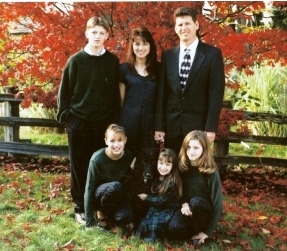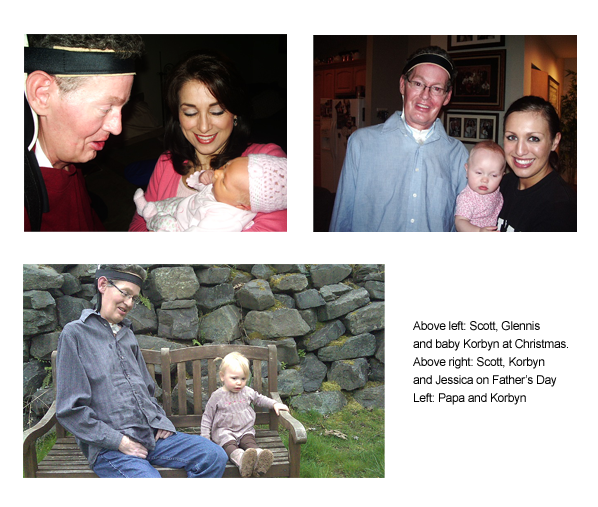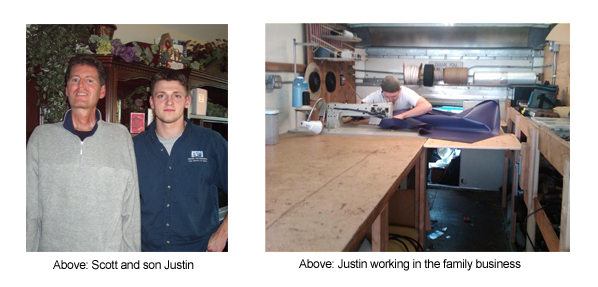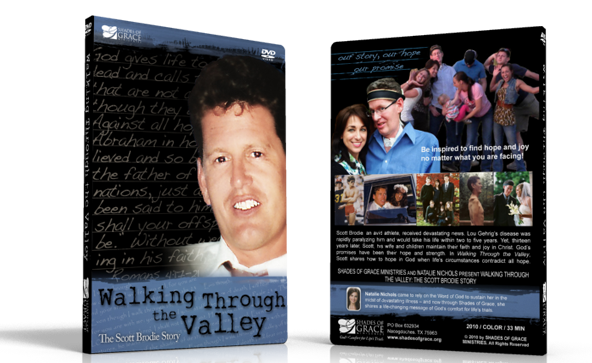Scott Brodie: Answers and Inspiration, Jack #3

Do you feel like you can’t get a break in life? Are you tired of life’s constant struggles? Does it seem like circumstances are too tough—too insurmountable? Scott Brodie has a word of encouragement for you today.
This post is part of a series on assisted suicide — but don’t let that keep you from perusing. No matter the topic, these videotaped excerpts from the Brodie home will bless and encourage you. They encouraged me greatly!
Scott and his wife Glennis shared their inspiring story in Walking Through the Valley: The Scott Brodie Story. (Click also below to watch.) Every time I catch a glimpse behind the scenes of Scott’s journey with ALS, I am instantly, deeply, eternally changed. My perspective is transformed. If you are walking through hardship great or small, come go with me to the Brodie home and be encouraged…
The Scene
From behind the camera comes a soothing, upbeat voice. If you were listening to the audio alone, you might think she doesn’t have a care in the world. One glimpse through the lens, however, reveals an entirely different picture.
Sitting in a chair, her husband Scott cannot move his arms or hands. Underneath his shirt is a back brace that holds his head up. It extends from his lower back to the crown of his head. Although he can’t turn his head in the brace, thankfully it allows him to sit upright, walk and move around.
Lou Gehrig’s disease, or ALS (Amyotrophic Lateral Sclerosis), has also affected Scott’s speech. Glennis has become accustomed to ‘interpreting’ over the years. (When I interviewed Scott and Glennis on camera in 2006, Glennis anticipated having to interpret Scott’s words – so only she was miked for sound. Surprisingly, Scott spoke the entire time and could be clearly understood.)
The tracheostomy Scott had last year reduced his ability to speak even more. At night, when Scott is on the ventilator, he cannot speak at all because the cuff is inflated. Glennis interprets as he spells letters with his foot. She’s very adept at interpreting. Sometimes Scott only has to sign a few letters and Glennis figures out the whole word…maybe even the entire phrase. Of course, it helps to have been married for twenty-five years. I suppose after all that time you could almost read your spouse’s mind.
A couple of weeks ago, I saw a brief segment of Larry King’s interview with Jack Kevorkian. I was appalled. Absolutely sickened. God immediately gave me the idea of calling Scott Brodie to ask him to watch the next airing of the Kevorkian interview and share his thoughts with us.
I had forgotten, until I watched the next airing myself, that Thomas Youk – the man for whose murder Kevorkian was sentenced to prison – had ALS, like Scott Brodie. (Perhaps I was too sick when the conviction occurred to remember this key fact.) In typical fashion, God was working in the details. He knew Scott’s input on this topic would be invaluable.
Scott types with his toes and has an incredible blog. He maneuvers the mouse with his feet and accomplishes a great deal on the computer and the internet. I look forward to a true ‘guest post’ from Scott in the future – one without my words – but this week, in order to post a prompt response to a vital issue, this guest post became a collaborative effort between Scott, Glennis and me.
Below is video of Scott’s post – as well as a dialogue transcript that includes Glennis’ interpretations and elaborations. I’m glad she weighed in! Assisted suicide has become an appealing idea to caretakers as well.
A documentary about Kevorkian, the assisted-suicide advocate, began airing this week on HBO. A companion piece to the HBO movie “You Don’t Know Jack,” starring Al Pacino and Susan Sarandon, the documentary sparked a pro-killing media blitz across the nation. One would hardly recognize it as such, though, for killing is beautified – packaged as mercy at its best. The movie, documentary, interviews and press coverage have produced an innocent, enticing image of murder and suicide.
Who stands to be influenced? Strictly patients with a terminal illness? No. When the sanctity of life erodes, all life is cheapened. One sector of society gains authority to determine whether others’ lives are valuable enough to exist. Ultimately, it affects everyone – even you and me.
To whom does the idea of euthanasia / assisted suicide appeal? Well, to name a few groups:
- To busy people who don’t want to care for aging parents.
- To insurance and state healthcare agencies who prefer to fund assisted suicide rather than costly life-extending treatment.
- To someone who has a progressive disease, or is depressed, or is struggling financially or in chronic pain.
- Even to someone who is in despair over the future loss of a spouse, as in the case of Sir Edward Downes,
Once we slide further down this slope, the impact upon our lives and freedoms will be devastating.
If ever there was a time we needed to hear from Scott Brodie, it is now. As I watched the second airing of Larry King’s interview with Kevorkian, six questions came to mind. I emailed them to Scott right away, expecting a typed response. The video response He and Glennis chose, however, is much more illuminating.
If you are too overwhelmed by a season of suffering to be concerned with broader issues at stake, it is understandable. Scott’s messages below will be just the encouragement and truth you need today. (See also his story in video below: Walking Through the Valley: The Scott Brodie Story.)
Question #1
What has been the progression of your illness?

Glennis: “Scott was diagnosed with ALS in the Fall of 1997.” [Scott was given just two to five years to live – thirteen years ago!] “The symptoms began in his right hand, then traveled up his right arm to the left arm and to his neck. It has affected his voice, his ability to talk, as well. He is still walking.”
“Scott had to have a feeding tube placed in 2005, five years ago. He is on a liquid diet of canned things or things we can puree and concoct.
“This back brace was about that same year – 2005. It may have been completed in 2006. But Scott walks with this back brace, which goes all the way down to his mid-back. It’s underneath his shirt. It keeps his head supported. That way he is able to maintain his balance. It gets a little hot. He can’t really turn his head side to side, but he can move.
“April 1, 2009 he had tracheostomy surgery. That was a huge, prayerful step in the months and year prior actually. But now a year has passed and he is doing really well. He has had to fight a reoccurring lung infection. So that has been the biggest challenge, but we seem to have a God-given way to manage that right now. We praise God for that.
“Scott has no use of hands, which limits him from many things – there are many things he cannot do. No driving, of course. He’s at his computer most of the day, but he types with his toes and operates the mouse with his foot. Most everything has to be done with his foot.
“Sometimes he will spell the letters out if he is on his ventilator (which is over there on that side of the room; It’s a laptop vent). At night and in the morning when he’s over there, he’s not speaking because the cuff is inflated. He can’t speak when that’s up. So he will spell letters with his feet and then I get to interpret…and that’s a lot of fun for me,” she says laughing.
[Natalie: Scott has difficulty swallowing…even saliva. He went through the whole one-hour interview in 2006 without complications from swallowing or expelling saliva. You may have noticed that in the interview footage there are paper napkins folded between the cushions of the couch, positioned by Glennis for quick access. The napkins were there to use in place of swallowing. Scott never once needed them. Amazing! Scott hasn’t been able to easily swallow saliva for some time…not without creating a tendency to choke. Even when he could technically swallow food – just for a little taste – after the feeding tube, small bites of food would create too much mucous. He would have to be suctioned. Years ago, when I was in his home, it was a rarity for him to taste a bite of food, though he could technically swallow.]
Question #2
What symptoms do you have that others may consider grounds for taking their life if they had same symptoms:
Glennis: “The thing about Lou Gehrig’s – it has been a progressive loss. It never levels off. Apart from God’s Divine intervention and healing, that’s the course it would take. It continues to rob the body, so that’s what it’s done over the years. Scott, what do you think have been the biggest hurdles along the way?”
Scott: “Probably the feeding tube and the trach.”
Glennis: “Those were definitely the biggest. The feeding tube because some people think its artificial nutrition. But it’s really just another access to the stomach. Scott doesn’t have the pleasure of eating and the social aspect of eating – although Scott likes to gather with people when they are here and participate – but he has to be an observer and eat from his ‘sack lunch.’
“It was hurdle for Scott to use the wheelchair, even though he wasn’t dependent on it. This was before the feeding tube, when He had lost so much weight. He was 120 pounds at six feet tall. He didn’t have energy or endurance to walk far. So that was a big, big hurdle.
“It was a big hurdle when Scott could no longer work or drive—”
Scott: “Talking,” Scott adds.
Glennis: “That has been the greatest loss – talking. He has gone months without talking. When his cuff is inflated in his trach, within his trachea, he’s not able to push air over the larynx. So there is no use of the voice box. When he is talking, his enunciation is a little hard to understand – “
Scott: “Even for me,” Scott adds.
Glennis: “When Scott sees himself recorded, he doesn’t know what the guy is talking about,” Glennis laughs.
“So yes, there have been a lot of things we’ve had to bring before God and get his grace to know how to continue on, right?
Scott: “Yes. Amen”
Question #3
Have the losses caused you to feel that your life has lost meaning?
Scott: “They did. But God overcame them through His Word.”
Glennis: “He ministered His Word to you personally and intimately and gave you the-”
Scott: “–hope”
Glennis: “–loved you and gave you the hope to continue on.
Scott: “God does not see as man sees. God sees the heart.
Glennis: “God sees the heart. He’s not impressed by physical stature.”
Scott: “Or your vast knowledge. He sees the heart.”
Glennis: “When you got your diagnosis, I remember, you said–have said–that you weren’t ready. Of course, you were thirty-seven. You weren’t ready to consider dying, but you also didn’t feel prepared to meet your Maker, although you were a believer and gave your life to Christ when you were eighteen. But here you were at thirty-seven and you said, ‘I’m not done.’ You knew God had more. That was really a driving force also – because you didn’t feel that you had accomplished everything that He’d given you to do.”
Scott: “He has a race for me to run. It was not complete yet. He said, ‘Go back to your race and only look to me – because I am the author and finisher of your race. Do not look at your body. Look to me.’”
Glennis: “Because when you used to look in the mirror and you would look at the losses, that was really devastating.”
Scott: “True.”
Glennis: “Yes. It really impacted you. Then you used to always say, ‘I’m not not that man in the mirror’ – because you were referring to the fact that God sees who you are in the heart, not the reflection that is illuminated through the mirror and what other people see.”
Question #4:
Do you feel that your life has meaning? Please explain.
Glennis: “Scott continues to have an impact on our family, our friends and those he meets. Frankly, people, even strangers – he draws a lot of attention. He is part of an immediate family, an extended family and he is well loved. Any person has these ties to family. And it means a lot to the people that are close to an individual that has suffering, it means a lot–”
Scott: “But I really don’t suffer.”
Glennis: “You don’t feel that you suffer? Well, most people would call it suffering because you have limitations and you haven’t been able to get – you’re not what’s considered normal, I guess.
“Scott’s life has tried all of us actually, because we have gone through different seasons of having to trust God ourselves – for our security, for our capacity, for the fear that might want to grip us at times, especially at times when things have gotten very scary with his health. We don’t know one day to the next what will happen, but we’ve watched God’s faithfulness. We’ve learned and watched how God has cared and provided and it’s helped us to draw close in our walk with God – to know how much he loves each one of his creation. He’s made them unique and wonderful. Scott is able to minister through his life. As testament, he is able to shine the love of God through himself to others, and he does that with our family. He does that with our friends and also to people that we just meet.
“The contributions Scott makes are countless – just as any individual who is impacting people. But I would say that our children have only benefited because they now have compassion. They serve, they look for people that need help. They are more keen to notice the needs of others. In our family life there is a lot of cooperation because we’re not just the adult figures telling our children what to do. We have asked for their help. They are participants and together this family operates, we need each other. So there’s been an amazing effort from everyone.”
Additional insight from Walking Through the Valley: The Scott Brodie Story
In the 2006 interview, Scott shared about a time that he was tired of fighting and wanted to go to Heaven. God answered him – and in that answer God shows us what value our lives have, no matter our abilities.
In the segment above, Scott and Glennis both mentioned “identifying in Christ.” What does that mean? They answer below in this raw, unedited excerpt from the interview. (Excerpt not included in Walking Through the Valley.)
In his post Walking Because of Jesus, Scott writes,
I think when people see me; they are confronted with the physical manifestations of this disease. They do not see my spirit that is hid in Christ. I always tell my wife that my brace and atrophied body is a disguise or costume I wear but who I really am is underneath the costume and are in my spirit. The Spirit of Christ that lives within me gives my body life and imparts to me the eternal truth of the Word of God. This is how I can be strengthened in the “inner man” affecting my will and what I can believe for.
[Natalie: Scott’s life has value beyond what even he and his family are aware. I know for myself personally, Scott’s faith and perseverance – and frankly his positive attitude – have set an incredible example. His and Glennis’ life-examples inspire and challenge me each day. Just editing the video and transcript of this interview taught and ministered to me and centered my priorities right where they need to be – on eternal things. Anxiety, worry and preoccupations all vanished in light of eternity. Their impact is immeasurable!]
Question #5:
If the possibility of Divine healing on earth were taken out of the equation, would you consider assisted suicide? Why not? Would you have considered it in the past? Why not?
Scott: “No – because only God knows the time and I do not want to take that away from Him.
“He just asked me last year [a few weeks before Glennis called 911 and Scott was rushed to ER because of respiratory failure] if I did not get healing, would I still follow Him. I said, ‘Yes, Lord. Live or die, I am Yours.’ So God holds the keys to life and death. Not me. It’s only the grace of God any of us are alive today.”
Glennis: “Last year, Scott did consider the reality that he might [be on his way to heaven]—there was a different time last year before and after his trachestomy surgery, when he thought ‘maybe I’m not going to get my healing’ and thinking ‘I’m going to be going to heaven soon.’ And he was okay with that. There was no fear. He thought, ‘I’ll be with Jesus. No problem. I don’t have to hold onto this.’ Scott really has over and over again laid his life at Jesus’ feet. I think in the early years he really clung to God’s promise of healing and it has kept him very fervent for healing and to be back to the way he was. But now he wants to glorify God however God sees fit.
“Scott decided last year – I remember his prayer – that he had to abide under the shadow of God’s wing and just trust Him that His way is perfect. We had a tough year last year. A lot of weighty things … we thought we had already reviewed them, but I guess you have to come back and reaffirm.”
Scott: “You always have to surrender your life to God because he knows the best plan for your life.”
Glennis: Yes, because doubt comes in and you think, ‘Did we actually [hear correctly]?—God surely you didn’t mean this.’ So I guess we do examine, ‘Okay, this is a new place God. I didn’t bargain for this. I only thought so far into my future, but not this far.’ So we have to keep going back for His grace, for Him to enlarge us for the next step.
Question #6
If you had a friend who came to you and said, I have just been diagnosed with ALS; I want to end my life. What would you say?
Glennis interprets Scott’s words: “Oh I see what you’re saying. If they want to end their life, they’re talking to the wrong guy – because you would just want to encourage them. What would you tell them?“
Scott: “God loves you very much and you are very valuable to Him and to others. And just because a doctor tells you that you have ALS [or terminal diagnosis], that your life is over, that is not true. You may be alive for years and have meaning and purpose. So just let God love you.”

Glennis: “Let God love you right where you’re at. Yes, that’s good. I know that for years, all we could do was believe against hope. Abraham did that. He believed in hope. Against hope, he believed in hope. That was such a stable verse for us. We said, even if we can’t muster the faith to believe much, we can hope that God is good and that He does love us and He has our best interest and His glory in view as these things are transpiring in our lives. We have to draw near to Him to know what to do. So we’ve looked for His guidance. We’ve looked for His wisdom in the therapies that Scott has done, in the steps that we’ve made in our business.

Kylee’s (youngest child) Graduation
“We have seen much in the last 13 years! Our wedding anniversary of 25 years was last September. Boy, we wouldn’t have thought that Scott would have seen that day.
“We’ve seen the graduation of our four kids. [Their youngest just graduated this year. She was six years old when Scott was diagnosed and given just two to five years to live.]”
“We’ve seen our daughters play volleyball in college.”

“Jessica [oldest daughter] graduated from college and got married. Scott walked her down the aisle [and danced with her at the reception].”

“Then Jessica became pregnant and we were like, ‘Oh, do we have those nine months? Will Scott see our first grand baby?’ And he did!

“Now [our granddaughter] is a year and a half and she comes and helps her Papa. She likes to help just like my kids like to help and they do what they can. She’s very cute. She comes and brings him a tissue and helps with the little things she can do. It’s so sweet.
“We’ve seen our son be raised up and take over the leadership of our business and we’ve seen expansion of our business into another state, into Arizona.
 “So we’ve watched God provide in so many ways. Things that we would’ve though, ‘Okay, there’s going to be devastation. There’s going to be lack. We are going to be in hardship.’ We’re not saying there hasn’t been a measure of those challenges, but as we look back we see, Wow, God has made a way! So we praise God for all He has done.”
“So we’ve watched God provide in so many ways. Things that we would’ve though, ‘Okay, there’s going to be devastation. There’s going to be lack. We are going to be in hardship.’ We’re not saying there hasn’t been a measure of those challenges, but as we look back we see, Wow, God has made a way! So we praise God for all He has done.”
Closing Thoughts:
The Dance
Natalie: “A picture is worth a thousand words,” the saying goes. To me, one action of Scott’s speaks as loudly as his profound words. When I see Scott and his family on home video engaging in this simple activity, volumes of truth are conveyed. Much is revealed about how Scott and Glennis have responded to catastrophic circumstances – and in turn, how their children have responded as well.
What is this activity? Dancing. Yes, that’s right! In the face of hopeless circumstances, the Brodies dance. When others would be angry at God, they praise Him. When others could only focus on what has been taken from their lives, the Brodie’s focus on what they’ve been given. When negativity would encroach on another, the Brodies celebrate the simple joys in life. When many would paste a permanent grimace on their face, laughter constantly fills the Brodie home.
This last video clip briefly shows Scott’s decline from being able to speak normally and hold his head up to experiencing difficulties with both…yet he literally dances through the storm. This is a must see!It will change your day!!
Questions:
- As you read the transcript and watched the footage, what was it about the Brodies that made you say, “God, I want to be like that in my difficulties!”? Was it their God-given joy? Strength? Peace? Perspective? Humor? Contentment? Knowledge of Scripture?
- What seems noticeably absent from your life now that you’ve seen it materialized in Scott and Glennis?
RELATED ARTICLES
- Walking Through the Valley: The Scott Brodie Story
- Celebrating Scott Brodie
- Hardship: God’s Training Ground — Scott Brodie Inspires
- Faith, Bravery, and the God Who is Able
Walking Through the Valley: The Scott Brodie Story
Scott Brodie, an avid athlete, received devastating news. Lou Gehrig’s disease was rapidly paralyzing him and would take his life within two to five years. Yet, thirteen years later, Scott, his wife and children maintain their faith and joy in Christ. God’s promises have been their hope and strength. In Walking Through the Valley, Scott shares how to hope in God when life’s circumstances contradict all hope.Be inspired to find hope and joy – no matter what you are facing!

Disclosure of Material Connection: Some of the links in the post above are “affiliate links.” This means if you click on the link and purchase the item, Shades of Grace will receive an affiliate commission. Regardless, I only recommend products or services I use personally and believe will add value to my readers. I am disclosing this in accordance with the Federal Trade Commission’s 16 CFR, Part 255 “Guides Concerning the Use of Endorsements and Testimonials in Advertising.”






 “Natalie Grace Nichols is experiencing God’s grace and freely expressing it. My wife, Betty, and I thank God for the ministry of Jesus through Natalie.”
“Natalie Grace Nichols is experiencing God’s grace and freely expressing it. My wife, Betty, and I thank God for the ministry of Jesus through Natalie.” “I’m so thankful that God is raising up women like Natalie for a new generation, providing biblically balanced teaching, encouragement, and comfort for people who are enduring life’s trials.”
“I’m so thankful that God is raising up women like Natalie for a new generation, providing biblically balanced teaching, encouragement, and comfort for people who are enduring life’s trials.”